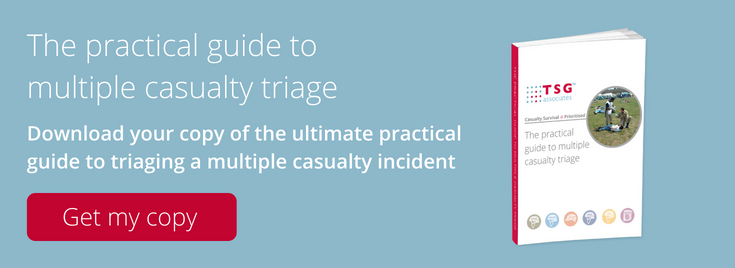

.png)
09/07/2024
TSG Talk- From crisis to change
Contemporary Warm Poem written by Major General Hodgetts - recited and discussed on TSG Talk
This poem was borne from the image of the funeral cortege passing through Wooten Bassett.
The Black Snake
“Long and black with high gloss back is our most deadly snake,
through glass belly the mourners see Britain on the caskets draped.
The legion’s flags with respect sag, dipping as the snake glides by.
A petal shower forms a thin cover as families in silence cry.
This wooden meals far from unreal’s a consequence of modern war,
where choice not need impels we feed the virtuous cycle to endure.”
You can listen to the poem by clicking the link.
In our latest episode, Senior Partner, Colin Smart had the privilege of hosting recently retired Surgeon General of the United Kingdom's Defence Medical Services Major General Tim Hodgetts.
Together, they delved into his career, the transformative power of effective leadership in improving patient outcomes, and the ten lessons he wished he’d known earlier in his career.
Lesson 10 - Decisiveness is the most valuable characteristic
The first point discussed was that decisiveness is the most valuable characteristic. General Hodgetts gave the example of Napoleon, who identified that nothing is more difficult and, therefore more precious than being able to decide.
He also talked about Colin Powell, the former United States Secretary of State who is famous for his 70/40 rule. His principle states if you wait for more than 70% of the information available, then the enemy may have already acted. It is safer to wait for 40% of the information so you can act before the enemy; this is also referred to as bounded rationality.
Lesson 9 – You can lead from anywhere in the organisation
Lesson nine was about being able to lead from anywhere in an organisation. He gave a personal example of when a medics social club at Musgrave Hospital, Northern Ireland was bombed by the IRA on 2/11/91 during the World Cup final. Although Major General Hodgetts was just a junior there at the time, he was the most senior ranking doctor on command at the time. Therefore, this point is “defined by your actions, not your appointment.” It is evident that leadership can emerge from any level within an organisation, not just from senior members.
Lesson 8 – It is easier to get forgiveness than permission
When considering what steps to take, it is always easier to get forgiveness rather than permission. An example he gave was General Sir Richard Barrons who said “proceed until apprehended.”
You must be able to make choices without obsessing over permission which wastes valuable time. Mission command requires and empowers people to do what they think is right to meet the commander’s intent and trust. This generates followership within the company and leads to better results.
Lesson 7 – Moral courage is as important as physical courage
The next lesson he explained was that moral courage is just as important as physical courage. The courage to do the right thing regardless of the sometimes negative consequences is essential. He mentioned a book after the Second World War by Lord Moran called “The Anatomy Of Courage”, in which the author characterises courage as “strength in the face of fear, pain or grief”. In essence, this is the courage to stand up for what you believe in.
Lesson 6 – You can, and indeed must, make time for what is important
In Lesson 6, the General Hodgetts talked about the importance of making time for what is important to you. He explained how you should find your most productive time of day and defend it! You should fill that protected time with creative things which make a difference in your life. You should also ensure you have time for reflection and thinking to enable growth.
Lesson 5 – It is hard, but absolutely worthwhile, to make something simple
In this lesson, he explained that it is difficult but worthwhile to make something simple that first appears complicated. He gave the example of how Churchill once said: “I’m sorry for writing you a long letter but I didn’t have time to write a short one”. He also discussed how Colin Powell identified characteristics of leadership as “Great leaders are almost always great simplifiers, who can cut through argument, debate and doubt, to offer a solution everybody can understand”.
Lesson 4 – The need for an adaptive leadership style
General Hodgetts then emphasised the need for an adaptive leadership style, stating there are seven leadership characteristic styles – charismatic, transformational, participative, transactional, adaptive, quiet and servant. The key is that different styles suit different environments and leaders have to be able to adapt their style to be a great leader.
Lesson 3 – Multi-nationality makes for slower but better decisions
In lesson 3 he explained how multi-nationality makes for slower but better decisions in an organisation. Every national approach is different and has advantages and disadvantages when compared to others. Some of these disadvantages are the language issues, the different scopes of practice and different guidelines in terms of drugs and protocol. But the advantage of multi-nationality is that you get the very best of each national approach by blending them into a hybrid system. This also creates burden sharing as different nationalities work together for a common purpose.
Lesson 2 – The world craves certainty in crisis and change
In this lesson, he explained how a key leadership characteristic is being able to cope with uncertainty. He gave the example of the physician to Henry V, Nicholas Colnay who said: “It’s the mark of a mature mind to bear uncertainty with equanimity”. The lesson to learn from this is to accept you do not know everything. This is similar to Colin Powell’s principle of 40/70, in that waiting for all the information can be a hindrance and is not always possible.
Lesson 1 – Change may appear easy, but people can be difficult and how do you deal with difficult people?
The last lesson discussed that it can appear easy to enact change at first, but to make lasting change, you must deal with difficult people who do not want it. Strategist Basil Liddell Hart said in the time between the world wars: “The one thing harder than getting a new idea into the military mind is getting an old one out.” It is crucial to consider how people may be obstructive to change and how you work around these obstructions to get the chance you want, as well as the amount of change you bring in because it might frighten your audience.
In 2017, Major General Hodgetts, along with other colleagues, wrote about dealing with difficult people and identified a “process zoo.” You can learn more about it in his article. He said on the topic that: “If you work in an organisation or part of an organisation where it's become more important to do it the right way than to do the right thing, then you may well be working in a process zoo.”
His poem below explains the characteristics of the different animals in the process zoo.
“Come and meet the animals,
The benign and passive sheet, the benign and active monkey, the
malignant and passive sloth and the malignant and active porcupine.”
The link between reading and leadership
Major General Hodgets finished by talking about the link between reading and education.
He talked about a quote from Oscar Wilde: “It is what you read when you don’t have to that determines what you will be when you can’t help it.” Reading is an essential part of preparing for leadership that you may not realise when you are reading that book. General Hodgetts explained how you must always consider: “What are you reading that is preparing you for the uncertain and most difficult situations of the future?”
A standard and favourite question on TSGTalk to conclude the conversation is ;
If you could on select one piece of medical equipment to have with you regardless of task, what would it be ?
Lastly he identified his essential medical equipment and gave his reasons why.
“As a young doctor - a pocket mask or a tourniquet. Identifying as a doctor in a leadership role - it may be a stethoscope around my neck as an identifying badge, or a whistle around my neck which with one blow can create instant silence and five seconds to give direction, order and calm.”
What advice would you give our listeners?
He then recommended a journal article he wrote.
“I will just signpost one journal article, and I wrote this during COVID to transfer lessons from the military to the civilian environment. It's in the journal BMJ leader and it's entitled innovating at pace during crisis. It's an open-source article, so there's no fee to download it. And what's in it is my distillation into a series of simple areas of what we've done well in military innovation and where we can continue to improve. Otherwise, I'd say go and reflect audience on those 10 lessons and see how it applies to your setting and give us some feedback if you can.”
This journal is available from BMJ Leader, Innovating at pace during crisis.
Click here to listen to the full TSG Talk episode featuring recently retired Surgeon General, Tim Hodgetts, to find out more about life-saving solutions, please call TSG Associates on 01422 557841 or email us at info@tsgassociates.










